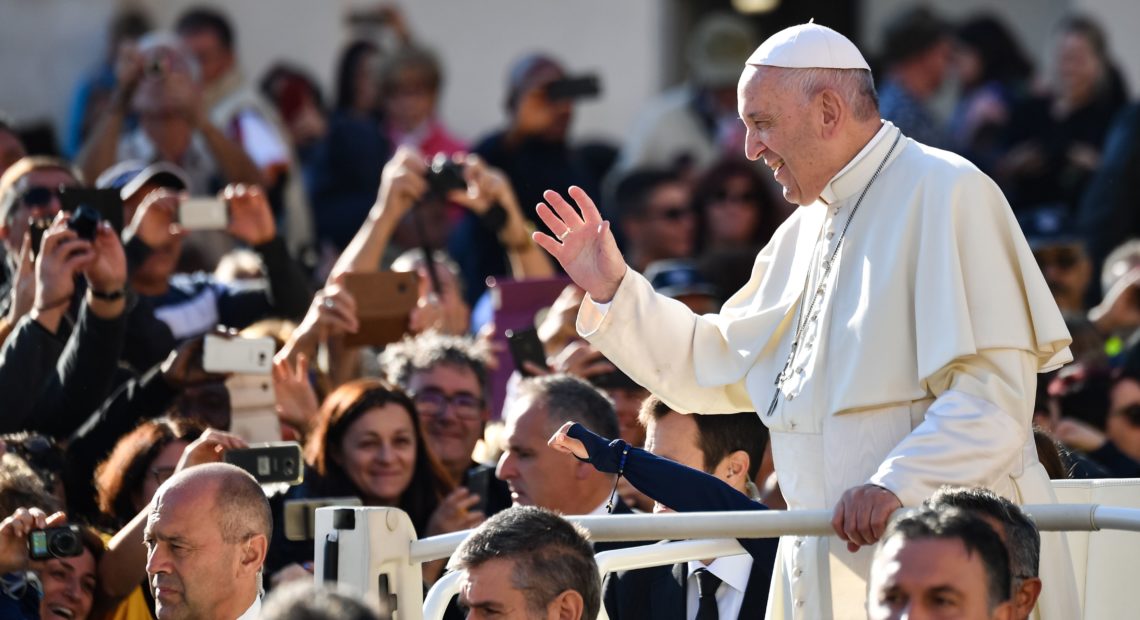
Resurgence Of Cleric Scandal Invigorates Conservative U.S. Critics Of Pope Francis
BY SYLVIA POGGIOLI
Every Sunday at noon, Pope Francis concludes his greeting to the crowd in St. Peter’s Square by wishing them a good Sunday meal.
But the warm cheers for the pope from the crowd in the square contrast with strident commentary that can be heard outside Vatican walls.
In America, some politically conservative Catholics have long criticized Pope Francis for being pro-migrants, anti-capitalist and less rigid on doctrine than his two predecessors.
More recently, the resurgence of clerical sex abuse scandals has further emboldened these critics of the pope who oppose his big-tent vision of the Catholic Church.
That sentiment can be heard in a video clip from Church Militant, an American website. The video was shot behind St Peter’s Square during the recent synod, a month-long bishops meeting that focused on youth.
“Welcome to The Vortex, where lies and falsehoods are trapped and exposed,” says commentator Michael Voris in the clip. “A cloud of homosexual immorality is hanging thick and low around Vatican City these days, as various churchmen with deep ties to — and support of — the gay agenda are running the show. Even the pretend Synod on the Youth is being viewed by those closely following it as little else than a pretense to advance more acceptance of sodomy in the church.”
Many of the pope’s most vocal opponents are in the United States, attacking him in tweets, blogs and conservative media.
At The National Review, Michael Brendan Dougherty accused Francis of having “plunged the church into acrimony and confusion” and Daniel Mahoney charged that the Argentine-born pope acts “more like a potentate … than a guardian of Christ’s teaching.”
Sex abuse revelations have further emboldened traditionalist Catholic media — like “First Things” and Lifesite – to publish articles blaming sex abuse on gay priests and accusing Francis of encouraging homosexuality. And yet, researchers in the field say they’ve found no evidence linking clerical pedophilia to sexual orientation.
“It’s kind of a perfect storm that has really tossed the pope’s pontificate around”, says David Gibson, director of the Center on Religion and Culture at Fordham University, who was in Rome for the Synod.
“This conservative opposition, which is very much based in the U.S., has been able to use the anger — the widespread anger over the sex abuse crisis — to create even more difficulties and opposition to Pope Francis,” Gibson says.
Blame escalated this summer after a disgruntled former Vatican diplomat — Archbishop Carlo Maria Viganò — accused Francis of covering up abuse, and called for the pontiff’s resignation.
When asked by reporters to comment on the letter, the pope said he would not, requesting them to reach their own conclusions.
That stance was praised as a sign of courage and spirituality in a commentary by Austen Ivereigh — author of a biography of Jorge Bergoglio, the man who became Pope Francis.
But Ivereigh’s commentary prompted Rod Dreher, writing for The American Conservative, to quip sarcastically, “you really have to be a hardcore drinker of the Bergoglian Kool-Aid to accept the line that the pontiff’s silence makes him Christ-like”.
Massimo Faggioli, a professor of theology at Villanova University, says that sort of harsh critique of the pope is new.
“Now, there is no shame in launching attacks that were unthinkable under John Paul II or Pope Benedict,” Faggioli says. He notes that only a handful of American bishops defended pope Francis against Vigano’s vitriolic attack.
“There is some kind of undeclared schism,” adds Faggioli. “As a Church historian I don’t remember anything like that happening in the last six centuries.”
Many moderate Catholics acknowledge Francis’ record on ferreting out sexual abuse is mixed. While he’s done much more than his predecessors, they say, concrete steps to hold bishops who have covered up predator priests accountable for those crimes have been lagging.
Gibson, of Fordham University, says Francis is in a bind.
“So much of this scandal was seeded and sown in the pontificate of John Paul II,” Gibson says. “And there’s a reluctance among many to go unearth all of that because, obviously, the pope has been canonized — he is Saint John Paul II.”
Gibson agrees with Francis the only way to eliminate sex abuse is to wipe out the sense of entitlement and unaccountability enshrined in that culture so dear to Roman Catholic conservatives — clericalism.
“He needs to change this culture of the ‘old boys’ network’ of secrecy, and of self-protection,” Gibson says. “That’s really the ultimate answer here”
But, Gibson adds, that sort of change will likely be a long time coming.















